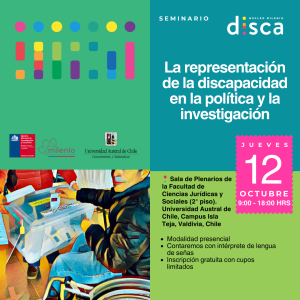Seminar “The Representation of disability in policy and research”.
Lugar: Universidad Austral de Chile, Campus Isla Teja
Fecha: 12/10/2023
Hora: 9:00 am
Link: https://forms.gle/VrFB4UdEEC6qZUxh7

We will address the issue of disability representation in policy and research. There will also be presentations of research on disability in various topics.
The event will take place on October 12, 2023 at the Universidad Austral de Chile, Campus Isla Teja, Valdivia, Chile, in face-to-face mode.
Disability representation is a vital tool for introducing, addressing and challenging ideas about disability. We recognize that, despite its potential to inform and change perceptions, representation can also reinforce inequalities and perpetuate existing stereotypes. For this reason, an in-depth scholarly analysis of how people with disabilities and disability as a phenomenon are and can be represented is crucial.
We will seek to generate a rigorous and diverse academic dialogue about disability in general and the issue of disability representation in policy and academic research. In addition, we seek to generate a meeting space for people who do research on disability.
The seminar will have two parts: during the morning, it will be an open space where research on disability from different disciplines will be presented. During the afternoon, the particular topic of disability representation will be addressed through two discussion tables, one on political representation and the other on representation in research.
The seminar will be held at the Universidad Austral de Chile, Campus Isla Teja, Valdivia, Chile, on October 12, 2023 from 9:00 to 18:00 hrs. The Seminar will be interpreted in Chilean Sign Language (LSCh) and for attendance, prior registration is required at this link.
Program
09:00 to 09:30 Welcome
09:30 to 11:00 Present your research in 10 minutes
Room 1 and 2 simultaneous
09:30 to 11:00 Present your research in 10 minutes (Room 2)
- Nelson Muñoz, University of Chile. Therapeutic itineraries of the rehabilitation process of children with disabilities and their families users of the Western Metropolitan Health Service of Santiago.
- Pamela Gutiérrez, University of Chile. Inclusion of people with disabilities and the concept of human rights in Chilean health policies.
- Pía Rodríguez-Garrido, University of O’Higgins. Obstetric and gynecological violence and its impact on the mental health of Chilean women with disabilities.
- Andrea Tereucán, Universidad de los Lagos. Experiences of health and care in childhood and adolescence of the Autism Spectrum in Osorno, a territorial view (1990-2023).
- Karina Pinto, University of Chile. Political Affections, Illness and Disability: Problematizing the biomedical model of rehabilitation from a feminist anti-empowerment perspective.
- Soledad Toro and Wanda Espejo, Una ruta sin Barreras. The right to recreational sports and tourism: personal assistance as a human right.
Space for questions
09:30 to 11:00 Present your research in 10 minutes (Room 1)
- Esteban Burgos, University of Concepción. The challenge of political inclusion in Chile: Barriers and Facilitators that affect the Electoral Participation of People with Disabilities.
- María Paz Santos Ricartes. Economic growth of people with disabilities.
- Daniella Leal, Pontificia Universidad Católica de Chile. People with Disabilities and their Participation in the Labor Market: Evidence from ENDIDE 2022.
- Andrea Montecinos, Juan González and Constanza Corvalán. Pontificia Universidad Católica de Valparaíso. The new legal status in relation to the entry to school of children with disabilities.
- Bárbara Suazo, University of Chile. The political from the common in organizations of the disability field: The case of Colectivo Autismo Chile between 2011 and 2019.
- Francisca Higuera, Shirlia Jara, Ana Lizama, Daniela Sepúlveda and Ninosca Bravo. Catholic University of Temuco. Dissonances of inclusion with Francisca Our companion and friend.
Space for questions
11:00 to 11:30 Coffee break
11:30 to 13:00 Present your research in 10 minutes
- Daniela Jaure, AVANZA Inclusion. Intellectual disability, social inclusion and quality of life. A look from those who are protagonists.
- Ninosca Bravo, Catholic University of Temuco. Social representations of special education pedagogy students about intellectual disability and developmental disabilities.
- Edison Calahorrano, Central University. The relational approach as a methodology for the representation of people with disabilities in scientific research.
- Mauricio López, DISCA Nucleus. The power of Experts by Experience: Co-creation of knowledge in disability research.
- Constanza López, University of Valparaíso. Care as a possible foundation for the production of knowledge: an approach from feminist disability studies.
- Jame Rebolledo, University of Chile. Research with disability activists from Feminist Epistemologies.
Space for questions
13:00 to 14:00 Lunch (included in the Seminar)
14:00 – 15:30 Panel 1: Political Representation of Disabilities
- Diana Vallejo, U. Iberoamericana Mexico City. The disca as a symbol of the transvaluation of the disabled.
- Diego Solsona, U. de los Lagos. Manufactured by the State, intervened from the biopower: the case of people with disabilities in Chile.
- Jaime Ramírez, U. of Chile. Analyzing the development of social mobilization of people with disabilities in Chile 15 years after the convention.
- Florencia Herrera, U. Diego Portales. ‘Look at me!’: Public and digital political campaigns of people with disabilities in the socio-political crisis in Chile.
15:30 to 15:45 Coffee break
15:45 to 17:15 Panel 2: Representation of Disability in Scientific Research
- Luis Vera, U. of Chile. Paola Arroyo, U. Alberto Hurtado. José Reyes, U. Academia de Humanismo Cristiano: “Disabled” teaching experiences. Reflections situated from the bodies.
- Vanessa Vega and Félix González-Carrasco, Pontificia Universidad Católica de Chile. Izaskun Álvarez, U. de las Américas. Inclusive research as an engine for the transformation of practices in intellectual disability.
- Valquiria Ramos, Pontificia Universidad Católica de Chile. Decision-making processes in academic journals on disability.
- Carlos Araneda-Urrutia, Pontificia Universidad Católica de Chile. Where are and how do academics with disabilities inhabit the university: Contributions for a methodological discussion about the affective infrastructures of academic capacitism.